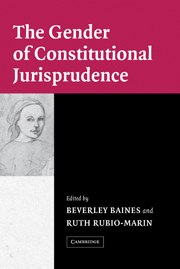Book contents
- Frontmatter
- Contents
- List of Contributors
- Acknowledgments
- The Gender of Constitutional Jurisprudence
- Introduction: Toward a Feminist Constitutional Agenda
- 1 Speaking into a Silence: Embedded Constitutionalism, the Australian Constitution, and the Rights of Women
- 2 Using the Canadian Charter of Rights and Freedoms to Constitute Women
- 3 Emancipatory Equality: Gender Jurisprudence under the Colombian Constitution
- 4 Gender Equality and International Human Rights in Costa Rican Constitutional Jurisprudence
- 5 Constituting Women: The French Ways
- 6 Gender in the German Constitution
- 7 India, Sex Equality, and Constitutional Law
- 8 Constitutional Transformation, Gender Equality, and Religious/National Conflict in Israel: Tentative Progress through the Obstacle Course
- 9 “No Nation Can Be Free When One Half of It Is Enslaved”: Constitutional Equality for Women in South Africa
- 10 Engendering the Constitution: The Spanish Experience
- 11 Gender Equality from a Constitutional Perspective: The Case of Turkey
- 12 Gender and the United States Constitution: Equal Protection, Privacy, and Federalism
- Index
- References
9 - “No Nation Can Be Free When One Half of It Is Enslaved”: Constitutional Equality for Women in South Africa
Published online by Cambridge University Press: 14 January 2010
- Frontmatter
- Contents
- List of Contributors
- Acknowledgments
- The Gender of Constitutional Jurisprudence
- Introduction: Toward a Feminist Constitutional Agenda
- 1 Speaking into a Silence: Embedded Constitutionalism, the Australian Constitution, and the Rights of Women
- 2 Using the Canadian Charter of Rights and Freedoms to Constitute Women
- 3 Emancipatory Equality: Gender Jurisprudence under the Colombian Constitution
- 4 Gender Equality and International Human Rights in Costa Rican Constitutional Jurisprudence
- 5 Constituting Women: The French Ways
- 6 Gender in the German Constitution
- 7 India, Sex Equality, and Constitutional Law
- 8 Constitutional Transformation, Gender Equality, and Religious/National Conflict in Israel: Tentative Progress through the Obstacle Course
- 9 “No Nation Can Be Free When One Half of It Is Enslaved”: Constitutional Equality for Women in South Africa
- 10 Engendering the Constitution: The Spanish Experience
- 11 Gender Equality from a Constitutional Perspective: The Case of Turkey
- 12 Gender and the United States Constitution: Equal Protection, Privacy, and Federalism
- Index
- References
Summary
… freedom cannot be achieved unless women have been emancipated from all forms of oppression … unless we see, in practical and visible terms, that the condition of the women in our country has radically changed for the better and that they have been empowered to intervene in all aspects of life as equals with any other member of society.
President Mandela (1994).When, in 1993, South Africans first started drafting a constitution for a democratic dispensation, gender equality was firmly on the agenda. However, the priority it should be given and the extent to which it should determine the development of the many systems of customary law in the country were disputed.
For most of the twentieth century, politics diverged along two, separate streams. White politics developed through official political and legal channels, while black politics did so outside the official structures. In white politics, South Africa saw changes relating to women's rights that more or less matched developments in the West. White women were given the vote in 1930. Laws relating to matrimonial property for white people were gradually reformed. In the 1980s, systematic challenges to inequality in the workplace began. Grave concerns concerning the situation of women who were not classified as white were occasionally raised in official political forums but, by and large, such concerns were dismissed with the assertion that black people were “not ready” for development or, more cynically in a system which gave black people no political representation, with the response “we cannot presume to tell black people how to run their affairs.
- Type
- Chapter
- Information
- The Gender of Constitutional Jurisprudence , pp. 230 - 255Publisher: Cambridge University PressPrint publication year: 2004
References
- 2
- Cited by

